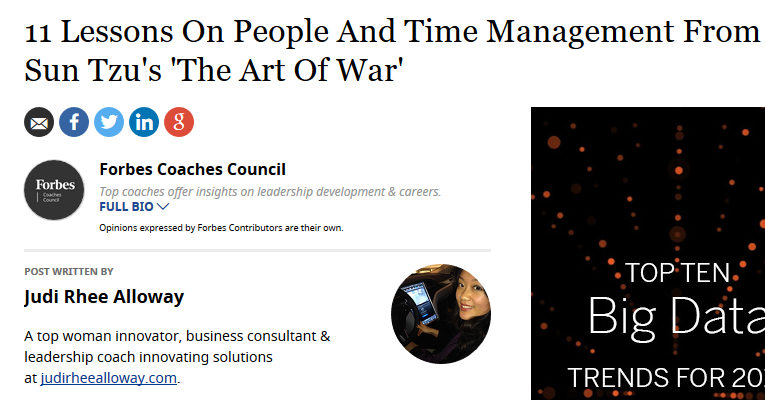Read this article on Forbes.com!
Most people instinctually manage both people and time. Like programmed machines, we have learned these instincts from family, friends, culture and society. These instincts can range from dysfunctional and self-sabotaging to extraordinary and well-functioning, but honing our approach to people and time management is crucial if we want to achieve our goals.
To help, I teach my clients Sun Tzu-inspired methods for both. Sun Tzu’s The Art of War has been a venerated classic for the past 2,500 years and is still one of the best leadership books of all time. Mesmerized by its influence and longevity, I bought my first pocket-sized copy when I was 16 years old, thus starting my decades-long study of the Chinese classic.
To further delve into the issues we face managing people and time, I researched and cross-correlated international leadership studies. The GLOBE Leadership study, headquartered at the Wharton School at the University of Pennsylvania, surveyed 17,300 middle managers in 951 organizations in 62 countries. Global Leadership and Organizational Behavioral Effectiveness (GLOBE) examined nine dimensions: performance orientation, future orientation, assertiveness, power distance, humane orientation, institutional collectivism, in-group collectivism, uncertainty avoidance, and gender egalitarianism.
Unsurprisingly, both Sun Tzu and this global study on cross-cultural leadership emphasized how important it is to learn people and time management skills.
Six Tips To Improve Your People Management Skills
Here are six tips to manage people like Sun Tzu does:
1. Scale your team to a manageable size. A high-functioning team should limit its number of people in order to agilely scale. Depending on industry and company culture, I recommend that my clients have no more than twenty people on their team.
2. Assess people’s states of being. Sun Tzu explains people’s motivations and moods, and how to maneuver depending on these motivations in various situations. I once had a client who, despite his organization’s funding drying out, didn’t want to try any proposed solutions. Even though he said he was motivated to “save the organization,” he didn’t make any efforts to do so. Why? Because he hated his job. A few resumes later, he found a new job and the organization found new, more motivated leadership.
3. Self-assess first. In chapter 8, Sun Tzu lists people management as one of the five advantages for assessing your areas of improvement. He recommends self-assessment to understand more about yourself and, eventually, your enemy. Along the same lines, we offer 360 Personal Brand Assessments that our clients send out to 50 people anonymously. As we review their self-assessment and feedback from others, we often find a correlation between how they assessed themselves and how others perceived them. It’s an eye-opening moment for our clients on how they can improve!
4. Examine other people for insights into conflict preparation. Sun Tzu looks to his team to understand how to prepare for conflict, and you should too. For successful conflict resolution, we usually rehearse and role play various outcomes with our clients. It helps them understand the nature of conflict and how to effectively create win-win solutions.
5. Don’t rush or micromanage. In chapter 10, Sun Tzu explains the faults of leaders “who rush, tarry, fall, crumble, riot and are beaten.” A former client embodied these traits, as he lacked delegation skills. His team watched videos all day, but were then given last-minute deadlines. This meant team members often had to stay late and sometimes work overnight. Needless to say, turnover was high.
6. Recognize “double agents” in your organization. In chapter 13, Sun Tzu discusses the five categories of spies. He outlines how to get information from five different types of people, including double agents. We understand the importance of recognizing “double agents” within your organization, so we offer a 13-week leadership program based on Sun Tzu’s advice that includes dealing with spies.
Five Best Practices For Time Management
Once you’ve learned how to better manage people, you also need to manage your greatest resource: time. Here are five best practices to create a time-management plan courtesy of Sun Tzu:
1. Timing is everything. I often work with politicians who are introducing new policies. Part of the strategy is to get these new policies passed with the least amount of resistance, which could be right before summer or winter vacation. Timing is everything!
2. Use your natural momentum to get things done. In chapter 5, Sun Tzu focuses on how your natural momentum can be utilized to get things done. When working with artists, we conduct a time audit to determine when it is their best time to create, work and network. It’s all about recognizing and riding your natural waves.
3. Victory requires a plan (and overtime). In chapter 7, Sun Tzu maps the route of conflict for victory. He talks about what do during the day and night to capture your victory, preferably without fighting. Similarly, our clients will often have to work overtime in preparation to pass the finish line and achieve their goals.
4. Remove resources to increase flexibility. We follow this principle when we conduct strategic planning sessions, offered through our Chief Strategic Officer package; we often recommend going offsite for company-wide annual retreats, where employees can talk earnestly without their families.
5. Prepare for next steps. In chapter 12, Sun Tzu suggests preparing for your next steps after destruction, including the destruction of your “enemies.” For example, our clients will often time marketing efforts, sales and one-time promotions to gain market shares based on their competitor’s losses.
These 11 tips on how to manage people and time have helped numerous clients of mine reach their seemingly impossible goals. Experience is your greatest teacher, and no one can take away your people and time management experience.
So get out of your comfort zone. Go explore. Apply for jobs above your level. Do things that would make your ancestors squirm and your descendants proud. Manage people and time like Sun Tzu.



0 Comments